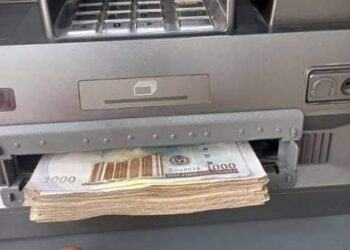As 2024 draws to a close, Lagos residents find themselves grappling with an unprecedented cash shortage, as Automated Teller Machines (ATMs) across the city remain empty.
Banks, unable to meet customer demands, are turning people away or imposing strict withdrawal limits of N10,000 to N20,000, exacerbating the plight of cash-reliant Nigerians.
Despite warnings from the Central Bank of Nigeria (CBN) to penalize banks failing to dispense cash via ATMs, the scarcity continues unabated. Frustration and despair are palpable among residents.
“I’ve gone to three banks today, and none had cash. How are we supposed to celebrate the season like this?” lamented Bright Joseph, a Lagos resident.
The crisis has left many at the mercy of Point of Sale (PoS) operators, who are exploiting the situation by imposing exorbitant charges.
For instance, withdrawing N5,000 now attracts fees as high as N500, a stark contrast to the N100- N200 charges a few months ago. Larger withdrawals see even steeper fees, forcing customers to pay inflated rates to access cash.
“I had to withdraw N10,000 yesterday, and the PoS operator charged me N1,000. It’s unfair, but I needed the cash,” said Benjamin Idowu, a civil servant in the Ogba area.
This financial burden disproportionately impacts low-income earners, who rely on cash for daily necessities like transportation, feeding, and small purchases.
A tier-2 bank official, speaking anonymously, blamed the CBN’s reduced cash supply.
“The CBN hasn’t been releasing cash to banks as before, and customer deposits have also dwindled. In such circumstances, how do we pay our customers? Banks don’t print money,” the official explained. The official questioned the CBN’s resolve to penalize banks, noting, “Why hasn’t any bank been sanctioned yet.
Amid accusations of collusion between banks and PoS operators, operators themselves have pushed back. “There is no truth to the allegations. In fact, I haven’t withdrawn cash from banks in months,” said Olawale Michael, a PoS operator in Ikeja.
Michael revealed that his cash supply comes from market traders, with whom he exchanges electronic transfers for physical cash.
“This arrangement benefits them too, saving them the hassle of depositing cash at banks,” he added.
Another operator, Nkechi, shared a similar struggle. “We source cash from fueling stations and pay extra to attendants. People blame us for high charges, but we’re also paying to get the cash,” she said.
In September, CBN Governor Yemi Cardoso announced that banks failing to dispense cash via ATMs would face sanctions. At the end of the 297th Monetary Policy Committee meeting in Abuja, he emphasized the need for sufficient cash circulation and promised a monitoring system to ensure compliance.
However, months later, no sanctions have been reported, and ATMs across Lagos remain dry.
For a largely cash-dependent society, the scarcity has triggered widespread economic and social challenges. Many Nigerians feel abandoned by both the banks and regulatory authorities.
Experts warn that prolonged scarcity could erode public trust in financial institutions and hinder economic activities, particularly for small businesses reliant on cash transactions.
Financial analyst Adekunle Adebayo noted, “The cash scarcity highlights deeper systemic issues in Nigeria’s monetary policy. Without immediate intervention, the situation could exacerbate economic inequality and slow down recovery efforts in other sectors.”
